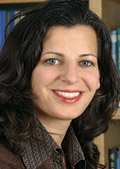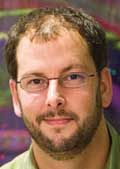Security Secretary
 | |
Juliette N. Kayyem |
Kennedy School of Government lecturer in public policy Juliette N. Kayyem ’91, J.D. ’95, was appointed undersecretary of homeland security, a new position, by newly elected Massachusetts governor Deval L. Patrick ’78, J.D. ’82. Kayyem has worked extensively on terrorism, security, and the law. Of Lebanese and American descent, she is the only known person of such background to hold a comparable state-level position in homeland security.
Post-Campaign Perch
Among the spring fellows at the Kennedy School of Government’s Institute of Politics are Kerry (Murphy) Healey ’82, lieutenant governor of Massachusetts during the past four years, who was defeated in last November’s gubernatorial race; Ned Lamont ’76, who unsuccessfully challenged Connecticut senator Joseph Lieberman; and Connecticut representative Nancy Johnson ’57, who lost her bid for election to a thirteenth term.
Top Tropical Scholar
Bullard professor of forestry emeritus Peter Ashton, who served as director of the Arnold Arboretum from 1978 to 1987, will receive the Japan Prize on April 19, with an honorarium of 50 million yen (about $415,000). He is being recognized for fundamental work in classifying tropical forests and in creating methods to study their biological diversity, productivity, and sustainable use.
Thanks for the Memories
 | |
Randy Lee Buckner |
The National Academy of Sciences has selected professor of psychology Randy Lee Buckner to receive the $50,000 Troland Research Award for contributions to understanding the neural mechanisms involved in forming and retrieving memories.
 | |
Bachrach | |
Owen Gingerich |
Stellar Scientist
Professor of astronomy and of the history of science emeritus Owen Gingerich was awarded the 2006 Janssen Prize by the Société Astronomique de France in recognition of his work on stellar atmospheres and his contributions to the history of astonomy. (Gingerich’s study of Copernicus and his influence, The Book Nobody Read, was featured in the November-December 2003 issue of this magazine.)
Moving West
The Civil Rights Project (see “Pursuing Civil Rights,” September-October 2003, page 82) is relocating to the University of California at Los Angeles, as co-founder Gary A. Orfield, professor of education and social policy, moves to take advantage of new program funding and to establish closer ties with a fellow scholar whom he recently married, Patricia Gándara.
Theatrical Changes of Scene
 | |
Gideon Lester |
The American Repertory Theatre announced on December 28 that artistic director Robert Woodruff would leave at the end of this year (his contract was reportedly not renewed). Woodruff was named to succeed founding artistic director Robert Brustein in 2001. Associate artistic director Gideon Lester will fill in on an interim basis. Provost Steven E. Hyman will direct the search for a new artistic director.





